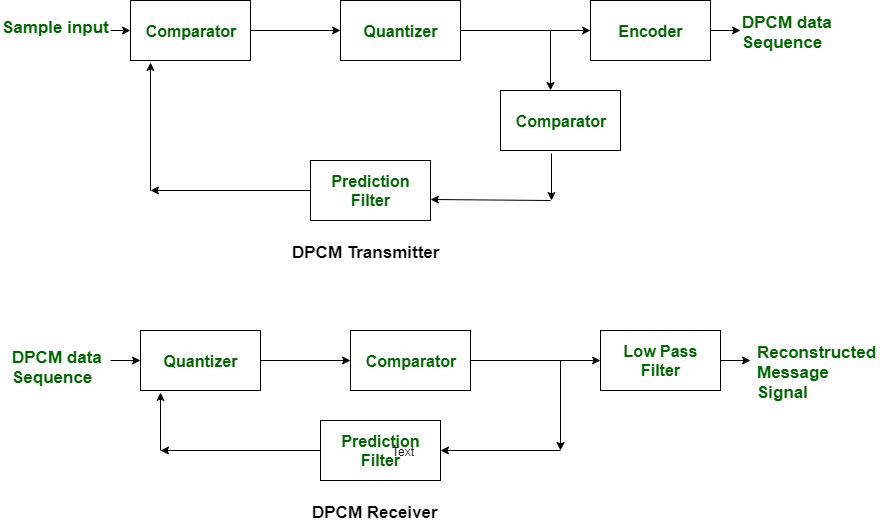Difference between PCM and DPCM
Last Updated : 11 Sep, 2024
When it comes to digital communication, two important techniques often come into play: In analog compression, we have Pulse Code Modulation (PCM) while Differential Pulse Code Modulation (DPCM is another kind of analog compression. These method are widely used for sampling the analog signals in to digital form, which can then be easily processed, transmitted and stored. But it is extremely important to comprehend the difference between the two for deciding the applicability of the method according to requirements in need of processing sound, in telecommunication, or data compression. Now let’s take a closer look at what defines the difference between these two directions.
Pulse Code Modulation (PCM):
PCM is the technique used for remodeling analog signal into digital signal. Pulse Code Modulation has good signal to noise ratio. For transmission channel, Pulse Code Modulation needs high bandwidth than DPCM.
The PCM method is split into 3 components, initial is that the transmission at the supply finish, second regeneration at the transmission path and also the receiving finish.
These steps are given below through figure:

How PCM Works
PCM can be understood in that it starts with an ordinary critical analog signal and samples it at a regular interval also known as the sampling rate. Thus, each sample is rounded down to a value within the quantize scale of discrete values/levels. Last, these quantized values are converted from analog format to binary format for transmission or storage in digital form. PCM is applied to audio recording, telephony and any other communication system where it is essential to have accurate model of the analog signal in digital form.
Differential Pulse Code Modulation (DPCM)
DPCM is same as the PCM technique used for remodeling analog signal into digital signal. DPCM has moderate signal to noise ratio.
DPCM differs from PCM as a result of it quantizes the distinction of the particular sample and expected price. that's the explanation it's referred to as differential PCM.
The operations at DPCM transmitter and DPCM receiver are given below through figure:

How DPCM Works
DPCM begins with estimation of the current sample from the previous sample of the series. It then determines the differential, or error between the actual sample and the predicted value. It is this difference that gets transmitted and encoded. The decoding process entails the reconstruction of the original signal through a technique of adding the transmitted difference on the last sample attained. That is why DPCM is particularly useful when the amount of bandwidth available is limited – in conference communications and streaming.
Difference between PCM and DPCM
| S.NO | PCM | DPCM |
|---|
| 1. | PCM stands for Pulse Code Modulation. | While DPCM stands for Differential Pulse Code Modulation. |
| 2. | In PCM, feedback is not provided. | While in DPCM, feedback is provided. |
| 3. | It has good signal to noise ratio. | While it has moderate signal to noise ratio. |
| 4. | It is less efficient than DPCM. | While it is more efficient than PCM. |
| 5. | For transmission channel, PCM needs high bandwidth(B). | Whereas DPCM needs less bandwidth(B) than PCM. |
| 6. | PCM is complex than DPCM in terms of complexity. | While DPCM is simple in terms of complexity. |
| 7. | In PCM, seven bits are transmitted per eight sample. | In DPCM, four bits are transmitted per six sample. |
| 8. | In PCM, for transmitting bits rate varies from fifty five to sixty four. | While in DPCM, for transmitting bits rate varies from thirty two to forty eight. |
Conclusion
The issues regarding the differences between the PCM and DPCM are significant for those who experience using the digital communication systems. PCM is quite simple and it gives the best digital representation of the signal but in DPCM approach there is better systematic method of coding the given data by minimizing redundancy. Due to such differences, the choice of one method over the other is given by the type of application, available bandwidth and whether or not compression is mandatory for that application.